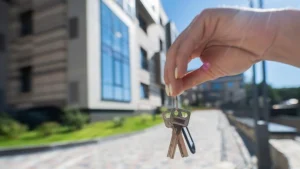Buying a home in Spain is one of the most important financial decisions a person can make. It's not just about choosing the right property, but also about knowing the details of the requirements for buying an apartment: from the documents required by law to the legal and financial steps that ensure a safe transaction.
This article brings together all the essential information so that both domestic and foreign buyers understand what is required, what documents they must gather, and what steps to follow before signing the deed.
Requirements for buying an apartment in Spain
Purchasing a property involves complying with legal, tax, and administrative requirements. Some requirements apply to all buyers, while others vary depending on the buyer's nationality or financial situation.
The main requirements include:
- Have a valid NIF or NIE:
- Spanish citizens use their NIF.
- Foreign buyers need a Foreigner Identification Number (NIE), mandatory for any real estate transaction.
- Spanish citizens use their NIF.
- Prove financial solvencyBanks and notaries will require proof of stable income or ability to pay, whether purchasing in cash or applying for a mortgage.
- Opening a bank account in Spain: especially important for foreigners, as it facilitates the transfer of funds, payment of taxes and associated expenses.
- Stay up to date with tax obligations: Both residents and non-residents must comply with the payment of the Property Transfer Tax (ITP) or VAT, as appropriate.
- Property registry and cadastral verification: It is essential to check that the apartment is free of any liens, encumbrances or debts with the community of owners.
What it takes to buy a flat: financial aspects
Before starting any procedure, it's necessary to assess your financial capacity. In Spain, financial institutions generally apply strict criteria:
- Previous savingsBanks generally finance up to 80% of the appraisal value for residents and 60-70% for non-residents. This means the buyer must have between 20% and 40% of the total price, plus an additional 10-12% for taxes and notary fees.
- Solid credit history: without outstanding debts and with income demonstrable through payroll, income tax returns, or income certificates in the case of self-employed individuals and entrepreneurs.
- Bank appraisal: an essential requirement for applying for a mortgage. The appraisal must be certified and is valid for six months.
- Mandatory insurance: In the case of a mortgage, it's essential to take out home insurance. Some lenders also require life insurance linked to the loan.
Documents needed to buy an apartment
Documentation is a critical aspect of any purchase and sale. Below are the most important documents for both the buyer and the property itself:
Buyer's documents
- Identity document: Valid DNI or NIE.
- Bank account number in Spain: to record financial transactions.
- Certificates of income and solvency: payrolls, employment contracts, tax returns or bank certificates.
- Pre-contract or deposit contract: initial agreement that commits both parties to the sale.
- Pre-approved mortgage (if applicable): document issued by the bank guaranteeing the financing.
Housing documents
- Simple note of the Property Registry: confirms ownership of the property and whether there are any outstanding charges or mortgages.
- Cadastral reference: necessary to identify the property to the Treasury.
- Energy efficiency certificate: mandatory since 2013 for all sales.
- Latest property tax and utility bills: prove that the property has no debts.
- Certificate of community of owners: proves that the apartment is up to date with community fees.
Steps to buying a flat in Spain
The purchasing process follows a scheme that is good to know to avoid unforeseen events:
1. Define budget and financing
- Calculate available equity.
- Consult with several banks to obtain the best mortgage.
- Consider not only the monthly fee, but also taxes, notary fees, and registration.
2. Search and selection of the apartment
- Compare locations, services, and market prices.
- Analyze the legal documentation for each property before making a decision.
3. Signing of the deposit contract
- A deposit of 10% of the property price is normally paid as a deposit.
- This contract establishes the conditions of the operation and penalties in case of non-compliance.
4. Formalization of the mortgage (if applicable)
- The bank must provide the Standardized European Information Sheet (SES) and the Standardized Warning Sheet (SWS).
- The buyer has the right to receive free advice from a notary before signing.
5. Public deed before a notary
- Essential act in which the sale and, where applicable, the mortgage are signed.
- The notary verifies that all documents are correct and that the parties understand the conditions.
6. Registration in the Property Registry
- Step that grants full legal security.
- Only upon registration does the buyer officially appear as the owner.
7. Payment of taxes
- VAT (10 %) in new construction.
- Property Transfer Tax (ITP) second-hand, which varies between 6 % and 10 % depending on the autonomous community.
- Documented Legal Acts (AJD) in case of a mortgage.
Key aspects for foreign buyers
Spain is a very attractive destination for international buyers. If applicable, in addition to the general requirements, it's important to consider the following:
- Obtain NIE before starting any procedure.
- Transfer funds through regulated channels to avoid money laundering problems.
- Specialized legal advice: especially in remote operations or when the language is not mastered.
Common mistakes to avoid
- Not checking the property's registration status before signing.
- Signing contracts without legal advice.
- Underestimating additional expenses (taxes, notary, registration, management).
- Do not compare several mortgages and accept the first bank offer.
- Believing that the sale ends with the signing of the deed: registration in the registry is essential.
Professional advice: a guarantee of safety
The Spanish real estate market combines opportunities with a degree of legal complexity. Therefore, having expert guidance makes every step easier and ensures a risk-free investment. For those seeking reliable information and personalized support, this is recommended. contact our real estate agents, who can manage everything from finding the apartment to signing the deed.


